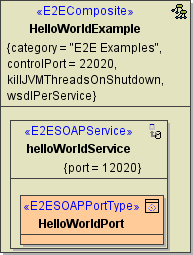Find below an example of an xUML composite containing an simple SOAP service:
Component Diagram of the HelloWorldExample
The <<E2ESOAPService>> holds the following tagged values:
| Tagged Value | Description | Allowed Values | |
|---|---|---|---|
| Authentication | |||
| authenticationMode | Defines the authentication mode to be used with this SOAP service.
Independent of the authentication mode, the user is found in the principal object if the authentication succeeded. | none | no authentication |
| HTTPBasicAuth | HTTP basic authentication | ||
| HTTPRemoteAuth | HTTP remote authentication | ||
| user | Specifies user and password for the use of HTTP Basic authentication. | Example: user/password | |
| HTTP | |||
| port | Specifies the machine port number the service is binding to. This port number can be given at the service level only. | any number | |
| Proxy | |||
| externalProxyHost | Specifies the host name as seen by the client.
| ||
| proxyProtocol | Specifies the used proxy protocol. | HTTP | use the HTTP protocol |
| HTTPS | use the HTTPS protocol (default) | ||
| proxyHost | Specifies the host for the proxy deployment. If localhost is used, the proxy will be created on the same host the service is deployed to. Use a dedicated host, if you want to run your proxy on a different host of the same Bridge domain. See also externalProxyHost. | any name | |
| localhost | default | ||
| proxyPort | Specifies the port the proxy is listening to. | any number | |
| 80 | default for HTTP | ||
| 443 | default for HTTPS | ||
| proxyPath | Specifies the part of the overall URL that is mapped to the actual host name and port. | <proxy URL>/<service host>/<composite name> | default |
| SOAP | |||
| encoding | Defines the encoding of the SOAP operation. See Encoding of SOAP Operations for more information on SOAP encoding and the Bridge. | rpc/soap | SOAP Remote Procedure Call (RPC) encoding |
| doc/literal | SOAP document-style encoding | ||
| timezone | Time zone string as specified in the time zone appendix. timezone is used to print DateTime expressions. | Examples: If "local" is used, the date/time is printed relative to the local timezone of the Bridge, for example: | |
| dateFormatString | Date formatting code as listed in Date and Time Formatting. If nothing is defined, the XSD standard is used. | Example: %F | |
| wsdlNamespace | Specifies the target namespace of the generated WSDL file. This is relevant only, if wsdlPerService in the xUML composite is true (see Frontend Components). | ||
